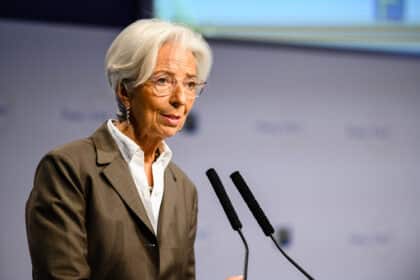On Thursday, the ECB increased interest rates for the seventh consecutive time, with the latest figure aligning with analysts’ predictions.
The European Central Bank (ECB) has hiked interest rates for a seventh consecutive time as its war against inflation wages on. Today, the eurozone central bank hiked rates by 25 basis points as expected following its May policy meeting. The latest rate hike decision also sees the main refinancing operations’ interest rate increased to 3.75%. In addition, the rate on the marginal lending facility and the deposit facility also grew to 4% and 3.25%, respectively. This is the seventh straight meeting ending in a hike.
Analysts Predicted ECB Seventh Consecutive Interest Rates Hike Would Come in Relatively Low
Economists and market observers expected the ECB’s seventh interest rate hike to be smaller than its predecessors due to contracting financial conditions. Although inflation still appeared unrelenting, rising 7% in April, the spate of accompanying rate hikes in the West threatened a recession. Analysts also pointed to the extreme drop in credit demand due to stricter lending criteria, proving that the ECB’s latest rate hike would be far from the higher end of its basis points (bps) range.
For instance, Davide Oneglia, an investment research analyst at macroeconomic forecasting consultancy TS Lombard, had weighed in ahead of the ECB’s latest hike. According to Oneglia, “from a risk management perspective, shifting to 25 basis points would give the ECB the flexibility to deal with both upside and downside risks to growth and inflation. So, a 25 basis points hike is not necessarily ‘dovish.’ For now, we maintain our call for a 3.75% ECB terminal rate”.
April Eurozone Inflation Numbers
Inflation in the eurozone grew 7% in April, with Germany and France experiencing the highest increases in consumer prices. However, despite these increases, core inflation, excluding food, fuel, tobacco, and alcohol, in the eurozone has slowed from 5.7% to 5.6%. The core inflation development is lower than consensus expectations and marks the first decline since June 2022 as central banks angle for a sustained decrease. However, despite the slowdown in core inflation, the present figure still far exceeds the ECB’s target of 2%.
Meanwhile, analysts anticipated that food, alcohol, and tobacco would have the highest annual rate in April of 13.6% compared with March’s 15.5%. Coming in a distant second is non-energy industrial goods, which turned out at a yearly rate of 6.2% last month compared to 6.6% in March. Lastly, services increased 5.2% compared to March’s 5.1%, while energy prices climbed again by 2.5% after dropping 0.9% in March.
Opinions remain divided on the ECB’s rate hike stance to curtail swelling inflation amid a banking crisis. For instance, Italy’s central bank chief Ignazio Visco previously warned that further rate increases would hamper the economy and create financial risks. Furthermore, Visco pointed out that more people would suffer greatly due to excess rate increases. However, his Dutch counterpart Klaas Knot believes that the ECB should continue hiking interest rates into the summer.
The US Federal Reserve also recently hiked rates by another 25 basis points, which took interest rates above 5%.
next